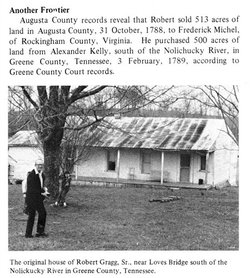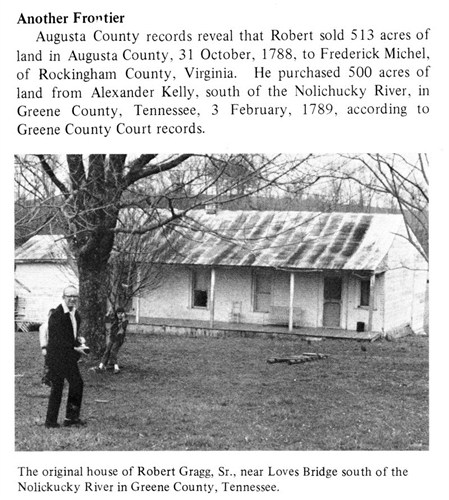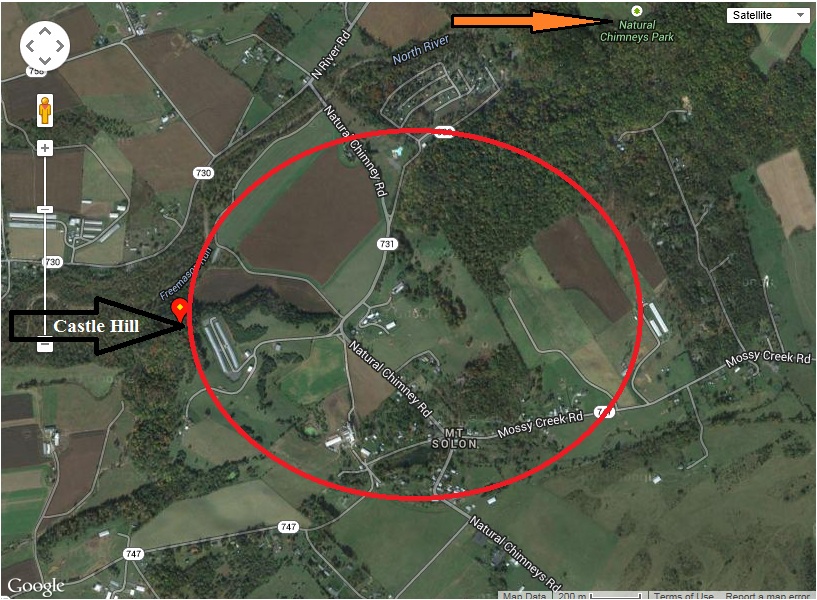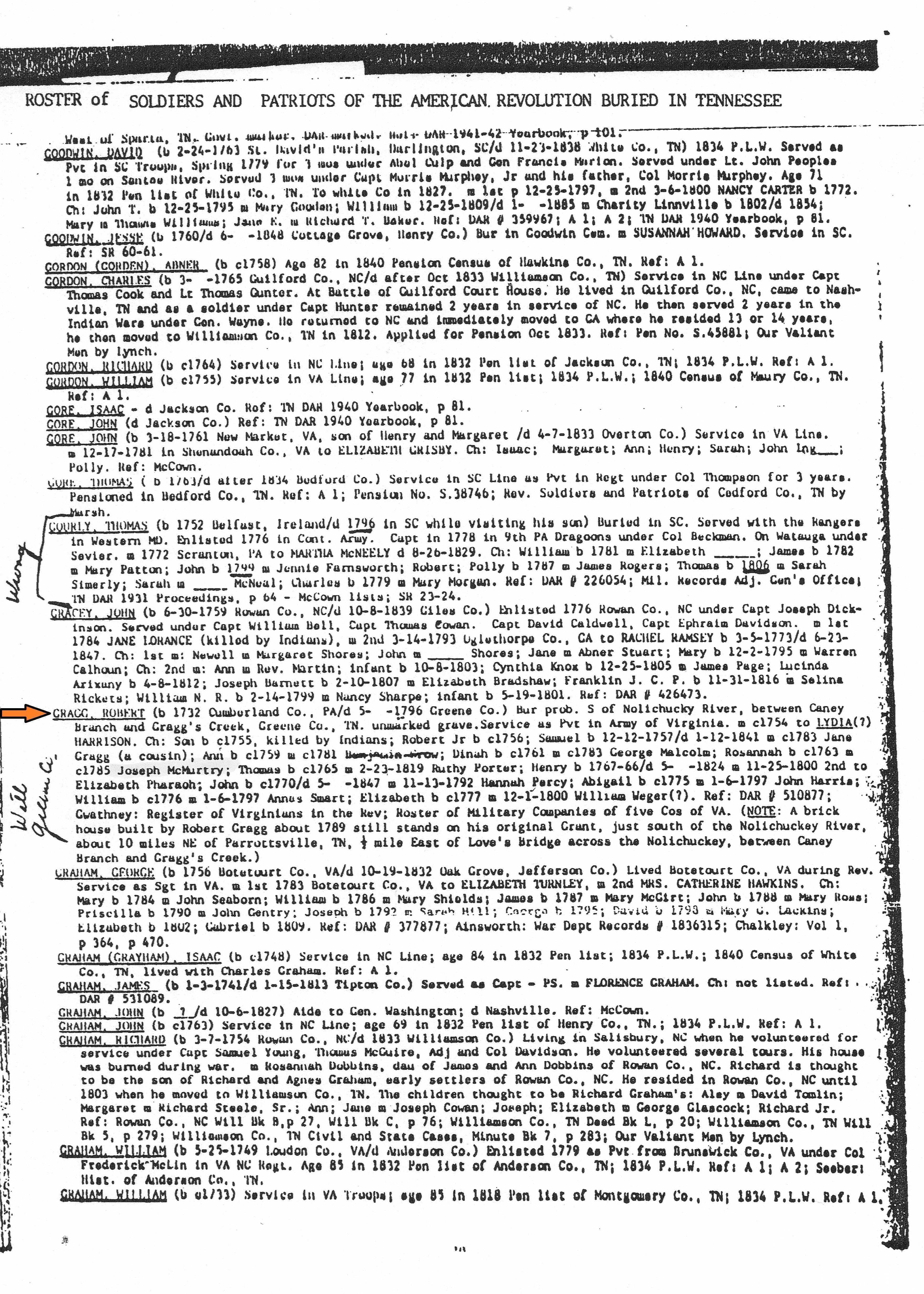Robert married Lydia Alice Harrison in 1754,in Augusta County, Virginia
The family lived in Cumberland County, Pennsylvania, for a period of years, then migrated southwest through the Shenandoah Valley, to Augusta County, Virginia* , in the early 1750s.
Robert sold his Virginia Farm, and removed to Greene County, Tennessee (Nolichucky Settlement) to develop a new 500 acre farm out of the Tennessee forest.
~AUGUSTA COUNTY~ "Robert Gregg lived in Augusta County, Virginia, approximately 38 years and all of his known children were born there. As nearly as can be determined, he moved into the county with his father's family, about the year 1750. According to historians, the country now embraced in Augusta County was not entered by white men until the year 1716. The area was originally inhabited by Shawnee Indians. The first permanent settlement by white people in this section of Virginia was in 1726, on the Shenandoah River, a few miles below the present town of Port Republic. Although some were of German and English decent, the early settlers were almost exclusively of the Scotch-Irish race, natives of the north of Ireland, but of Scottish ancestry. Many had first settled in the south-central part of Pennsylvania, then migrated farther to the south and west to the Shenandoah Valley. Most of those early immigrants were dissenters from the Church of England - they were Presbyterian faith and victims of religious persecution in their native land. They were generally a profoundly religious people, bringing the Bible with them and as soon as possible erected log meeting houses in which to assemble for the worship of God. The Church of England was established by law throughout the colony but while a spirit of intolerance and inseparation from such a system prevailed in other parts of Virginia, the dissenters of the Valley had very little to complain about. The first Presbyterian minister in the Valley was the Rev. John Craig, born 1709, in County Antrim, Ireland. He was educated at Edinburg, was licensed to preach in 1737, and came to Augusta County in 1740. Augusta County was formed from Orange County in 1738. The new county consisted of all that portion of the Colony of Virginia, which lay west of the Blue Ridge Mountains; bounded on the north by the boundaries of Maryland, Pennsylvania, and the Rappahannock River on the west its territory embraced all of the land claimed by the British, without limit or extent and on the south by the Carolina line. Augusta County was named in honor of Princess Augusta, wife of Frederick Louis, Prince of Wales, the father of George III. After about 35 years of pioneering and living in Augusta County, Robert sold his land and buildings and moved to Holston Country (Tennessee). Augusta County court records show, "22 October 1788, Robert Gragg about to move to the frontier of North Carolina." The records also reveal that Robert sold his 513 acres of land to Frederick Michel of Rockingham County, Virginia."[1]
~Chalkley Quotes~
"Robert Gragg appointed surveyor of highway from Duck Ponds to Middle River."[2]
"Robert Gragg, from Winchester--witness."[3]
"Robert Gragg vs. John McDonald.--Plaintiff of Augusta County, 18th August, 1785. On that day plaintiff contracted to sell 37 acres to defendant. Consideration, bar iron and horses."[4]
"Robert Gragg is about to remove to the frontiers of North Carolina 22d October, 1788."[5]
"Henry Millar vs. Samuel and Robert Gragg.--Writ, 31st August, 1787. Executed" [6]
"Virginia Land Grant" - 31 Oct 1788 - 513 acres; 70 acres on Nores Run of North River of Shanidore; 400 acres, near Castle Hill... First tract patented to grantor, 6 Apr 1769; second tract patented to grantor, 10 Apr 1781; third tract patented to grantor, 1 Jun 1782. note: This land record was originally published in "Chronicles of the Scotch-Irish Settlement in Virginia, 1745-1800. Extracted from the Original Court Records of Augusta County" by Lyman Chalkley.[7]
Robert Gragg, Sr., and several members of his family, moved to Greene County, Southwest Territory *, about five years after the county was organized as a part of North Carolina, and about eight years before the area became a part of the State of Tennessee.[8]
*note: Greene County began as the Nolichucky settlement, which was established by pioneer Jacob Brown on land leased from the Cherokee in the early 1770s. The Nolichucky settlement aligned itself with the Wautauga Settlement centered in what is now Elizabethton.
~Military~
"Robert Gragg and his son, Samuel, who was seventeen years old at the time, served as privates under Capt. Sawyer and Col Christie in the 1774 campaign...According to Samuel Gragg, son of Robert, in his Revolutionary War Pension Application , the Indian expedition led them to the Tellico Valley towns of the Cherokee, and it was there that his father killed a half-breed Cherokee chief named McCormack. This McCormack was mentioned as a renegade in David H. Corkran's book, The Cherokee Frontier." [9]&[10]
Robert served i n the Virginia Militia , in 1758. While still living in Augusta County, Robert experienced more trouble with the Cherokee Indians during the American Revolution. He served under Capt. Sawyers, and Col. Christie in the 1774 expedition in Tennessee, which led them to the Tellico Valley towns of the Cherokee. Still later, more trouble with the Cherokee, after the family moved to yet another frontier in Holston Country (Tennessee)[9]&[10]
It is generally believed that Robert Gregg Sr. was buried on his Nolichucky settlement farm, Greene County, Virginia; where he died. As this was the custom during the era.
Sources:
[1] http://www.colonialgreggs.gfhp.co.uk/
[2]Chronicles of the Scotch-Irish Settlement in Virginia; Extracted from the Original Court Records of Augusta County 1745-1800 by Lyman Chalkley August 18, 1767 page 136
[3]Chronicles of the Scotch-Irish Settlement in Virginia; Extracted from the Original Court Records of Augusta County 1745-1800 by Lyman Chalkley August 19, 1768 page 151
[4]Chronicles of the Scotch-Irish Settlement in Virginia; Extracted from the Original Court Records of Augusta County 1745-1800 by Lyman Chalkley August, 1787 page 387
[5]Chronicles of the Scotch-Irish Settlement in Virginia; Extracted from the Original Court Records of Augusta County 1745-1800 by Lyman Chalkley November, 1789 page 392
[6]Chronicles of the Scotch-Irish Settlement in Virginia; Extracted from the Original Court Records of Augusta County 1745-1800 by Lyman Chalkley March, 1790 page 393
[7]Chalkley, Lyman. Chronicles of the Scotch-Irish Settlement in Virginia, 1745-1800. Extracted from the Original Court Records of Augusta County. Baltimore: Genealogical Publishing Co., 1965. Originally published in 1912. (26-332)
[8]"Gragg Descent" ~ George Robert Gragg 1978 pp-77
[9]"Gragg Descent" ~ George Robert Gragg 1978 pp-73
[10]"Gragg Descent" ~ George Robert Gragg 1978 pp-78
[11]http://www.wikitree.com/photo/jpg/Gragg-374-12
Note: more information on Robert Gregg Sr. can be found at - http://www.wikitree.com/wiki/Gregg-766
Robert married Lydia Alice Harrison in 1754,in Augusta County, Virginia
The family lived in Cumberland County, Pennsylvania, for a period of years, then migrated southwest through the Shenandoah Valley, to Augusta County, Virginia* , in the early 1750s.
Robert sold his Virginia Farm, and removed to Greene County, Tennessee (Nolichucky Settlement) to develop a new 500 acre farm out of the Tennessee forest.
~AUGUSTA COUNTY~ "Robert Gregg lived in Augusta County, Virginia, approximately 38 years and all of his known children were born there. As nearly as can be determined, he moved into the county with his father's family, about the year 1750. According to historians, the country now embraced in Augusta County was not entered by white men until the year 1716. The area was originally inhabited by Shawnee Indians. The first permanent settlement by white people in this section of Virginia was in 1726, on the Shenandoah River, a few miles below the present town of Port Republic. Although some were of German and English decent, the early settlers were almost exclusively of the Scotch-Irish race, natives of the north of Ireland, but of Scottish ancestry. Many had first settled in the south-central part of Pennsylvania, then migrated farther to the south and west to the Shenandoah Valley. Most of those early immigrants were dissenters from the Church of England - they were Presbyterian faith and victims of religious persecution in their native land. They were generally a profoundly religious people, bringing the Bible with them and as soon as possible erected log meeting houses in which to assemble for the worship of God. The Church of England was established by law throughout the colony but while a spirit of intolerance and inseparation from such a system prevailed in other parts of Virginia, the dissenters of the Valley had very little to complain about. The first Presbyterian minister in the Valley was the Rev. John Craig, born 1709, in County Antrim, Ireland. He was educated at Edinburg, was licensed to preach in 1737, and came to Augusta County in 1740. Augusta County was formed from Orange County in 1738. The new county consisted of all that portion of the Colony of Virginia, which lay west of the Blue Ridge Mountains; bounded on the north by the boundaries of Maryland, Pennsylvania, and the Rappahannock River on the west its territory embraced all of the land claimed by the British, without limit or extent and on the south by the Carolina line. Augusta County was named in honor of Princess Augusta, wife of Frederick Louis, Prince of Wales, the father of George III. After about 35 years of pioneering and living in Augusta County, Robert sold his land and buildings and moved to Holston Country (Tennessee). Augusta County court records show, "22 October 1788, Robert Gragg about to move to the frontier of North Carolina." The records also reveal that Robert sold his 513 acres of land to Frederick Michel of Rockingham County, Virginia."[1]
~Chalkley Quotes~
"Robert Gragg appointed surveyor of highway from Duck Ponds to Middle River."[2]
"Robert Gragg, from Winchester--witness."[3]
"Robert Gragg vs. John McDonald.--Plaintiff of Augusta County, 18th August, 1785. On that day plaintiff contracted to sell 37 acres to defendant. Consideration, bar iron and horses."[4]
"Robert Gragg is about to remove to the frontiers of North Carolina 22d October, 1788."[5]
"Henry Millar vs. Samuel and Robert Gragg.--Writ, 31st August, 1787. Executed" [6]
"Virginia Land Grant" - 31 Oct 1788 - 513 acres; 70 acres on Nores Run of North River of Shanidore; 400 acres, near Castle Hill... First tract patented to grantor, 6 Apr 1769; second tract patented to grantor, 10 Apr 1781; third tract patented to grantor, 1 Jun 1782. note: This land record was originally published in "Chronicles of the Scotch-Irish Settlement in Virginia, 1745-1800. Extracted from the Original Court Records of Augusta County" by Lyman Chalkley.[7]
Robert Gragg, Sr., and several members of his family, moved to Greene County, Southwest Territory *, about five years after the county was organized as a part of North Carolina, and about eight years before the area became a part of the State of Tennessee.[8]
*note: Greene County began as the Nolichucky settlement, which was established by pioneer Jacob Brown on land leased from the Cherokee in the early 1770s. The Nolichucky settlement aligned itself with the Wautauga Settlement centered in what is now Elizabethton.
~Military~
"Robert Gragg and his son, Samuel, who was seventeen years old at the time, served as privates under Capt. Sawyer and Col Christie in the 1774 campaign...According to Samuel Gragg, son of Robert, in his Revolutionary War Pension Application , the Indian expedition led them to the Tellico Valley towns of the Cherokee, and it was there that his father killed a half-breed Cherokee chief named McCormack. This McCormack was mentioned as a renegade in David H. Corkran's book, The Cherokee Frontier." [9]&[10]
Robert served i n the Virginia Militia , in 1758. While still living in Augusta County, Robert experienced more trouble with the Cherokee Indians during the American Revolution. He served under Capt. Sawyers, and Col. Christie in the 1774 expedition in Tennessee, which led them to the Tellico Valley towns of the Cherokee. Still later, more trouble with the Cherokee, after the family moved to yet another frontier in Holston Country (Tennessee)[9]&[10]
It is generally believed that Robert Gregg Sr. was buried on his Nolichucky settlement farm, Greene County, Virginia; where he died. As this was the custom during the era.
Sources:
[1] http://www.colonialgreggs.gfhp.co.uk/
[2]Chronicles of the Scotch-Irish Settlement in Virginia; Extracted from the Original Court Records of Augusta County 1745-1800 by Lyman Chalkley August 18, 1767 page 136
[3]Chronicles of the Scotch-Irish Settlement in Virginia; Extracted from the Original Court Records of Augusta County 1745-1800 by Lyman Chalkley August 19, 1768 page 151
[4]Chronicles of the Scotch-Irish Settlement in Virginia; Extracted from the Original Court Records of Augusta County 1745-1800 by Lyman Chalkley August, 1787 page 387
[5]Chronicles of the Scotch-Irish Settlement in Virginia; Extracted from the Original Court Records of Augusta County 1745-1800 by Lyman Chalkley November, 1789 page 392
[6]Chronicles of the Scotch-Irish Settlement in Virginia; Extracted from the Original Court Records of Augusta County 1745-1800 by Lyman Chalkley March, 1790 page 393
[7]Chalkley, Lyman. Chronicles of the Scotch-Irish Settlement in Virginia, 1745-1800. Extracted from the Original Court Records of Augusta County. Baltimore: Genealogical Publishing Co., 1965. Originally published in 1912. (26-332)
[8]"Gragg Descent" ~ George Robert Gragg 1978 pp-77
[9]"Gragg Descent" ~ George Robert Gragg 1978 pp-73
[10]"Gragg Descent" ~ George Robert Gragg 1978 pp-78
[11]http://www.wikitree.com/photo/jpg/Gragg-374-12
Note: more information on Robert Gregg Sr. can be found at - http://www.wikitree.com/wiki/Gregg-766
Family Members
Advertisement
Records on Ancestry
Sponsored by Ancestry
Advertisement










